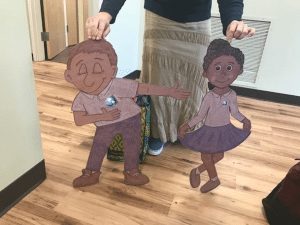Why Don’t Montessori Preschools have Fantasy Books
Montessori educators are often questioned about the lack of fantasy books or cartoon characters in the Montessori early education classroom. Are Reggio and Montessori philosophies stifling children’s imaginations or just plain boring? It’s quite the opposite. Real-life concepts are just what toddlers need to nurture a sense of wonder and develop a vivid imagination.
The Young Child Does Not Distinguish Fantasy From Reality
From birth through the early childhood years, children do not have the mental facility to know what is real and what is not. How could they, when they are in a developmental phase of learning what the world is by soaking in a vast amount of sensory input?
It may seem harmless, but it is quite confusing for a child to be presented with a whole set of ideas and beings that he cannot know are not really part of the world. This confusion doesn’t always lead to major frustrations, but if we step back it is clear that the most respectful way to teach a child is to remain at his cognitive level. In other words, adults should stick with presenting reality.
Reality Is Fascinating to Toddlers
Not to worry though–the real world is extremely interesting to the young child. She loves learning the names of everything around her and being able to categorize everything from animals to construction vehicles. Concrete, real topics like colors, shapes, professions, and foods are hugely engaging to little ones. There is no need for fantasy books with how amazing real life is.
Reality Is The Basis of a Developing Imagination
Maria Montessori said, “The true basis of the imagination is reality.” Someone once imagined a unicorn, but they had to use what they knew about horses and animals with single horns, like rhinos or narwhals. Or maybe they simply imagined a goat or dear with a single horn in the center. Regardless, the unicorn, which is a figment of the imagination, can only be conceived using pieces of the real world. The great authors and artists of our time were all inspired by the beauty of what concretely exists in the world. The more a child has to draw from, the great her own creations will be when she begins to think imaginatively. She does not need to rely on fantasy books.
Fantasy At An Early Age Robs the Child of Creativity
Letting children control and manipulate their environment is a key qualification for optimal learning, according to Montessori philosophy. Let us consider the fact that unrealistic characters like talking animals who wear clothing are a figment of the adult imagination, which, through shows or storybooks, is imposed upon the child’s mind. Little kids absolutely will begin to concoct unrealistic ideas but it is very important that these ideas originate in their own minds. That is active thinking, rather than the passive watching or listening to stories written by adults.
Toddlers Want Nothing More Than To Imitate Adult Tasks
Babies and young children have a naturally strong desire to do what the adults in their lives do. They love dressing baby dolls, washing windows, and preparing simple sandwiches. This period of life is a time where they are learning to participate in society.
The plain reason why you won’t see fantasy topics on the shelves in a Montessori daycare is they are simply not developmentally ideal. Montessori is about preparing the developmentally ideal environment for a child, so it just would not make sense.
As children grow, they slowly begin to get a grasp on what fantasy is and how it differs from reality. By age six, this understanding is usually fairly solid. When they are older, fantasy stories and fairy tales take on a new meaning and play an important role in education. When we wait for the right time to introduce pretend characters, they give immense value to children. Trying to do it too soon, however, is not helpful.


